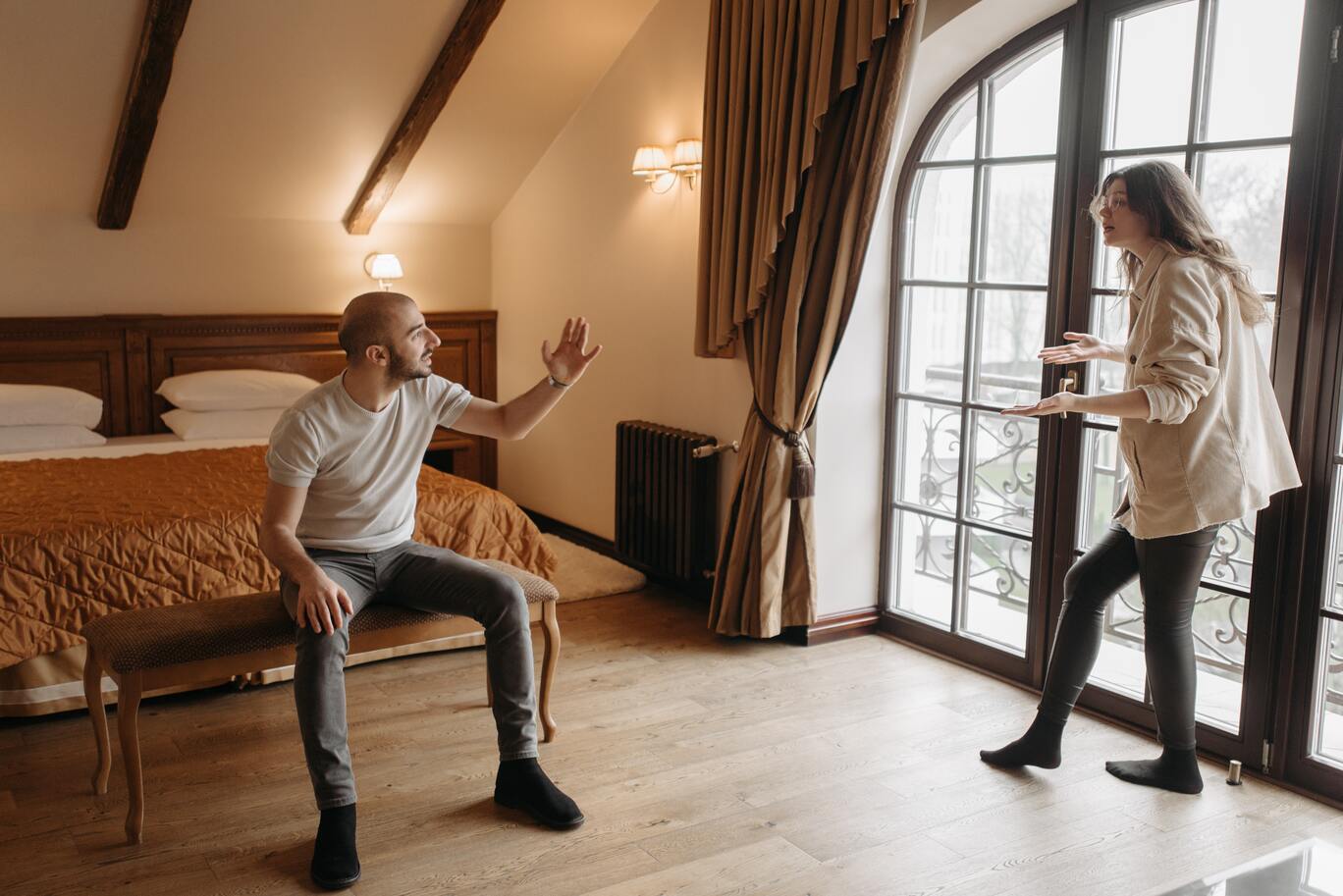
For those of us living with anxiety, we understand that it isn’t just about us once you bring a loved one into play. No matter how we feel about ourselves and what we’re going through, our spouse may not be on the same page. This can strain relationships when you think, “My husband doesn’t understand my anxiety.”
You don’t want ignorance to get in the way of your relationship. So, if you’re wondering about how to explain anxiety to my husband, then you’ve come to the right place.
Quick Rundown
As we prepare on how to address the subject of “how to explain anxiety to my husband”, let’s take a look at some key questions and answers first. This can give you an idea of what to expect later on:
What do I do when my husband doesn’t understand my anxiety?
The best thing to do is to talk about it with your husband. Keeping things bottled up inside can only make the situation worse, so prepare to have a meaningful conversation with your spouse to help him better understand your anxiety.
Can anxiety ruin a marriage?
Anxiety alone may not ruin a marriage, but if it comes in between your relationship, then there is cause for concern. It’s the lack of understanding that can bring tension to a marriage, especially if one of your worries is: “My husband makes my anxiety worse.”
Should I tell my husband about my anxiety?
Keeping your anxiety a secret is like keeping anything about your health secret in a relationship: it may not end well. Trust and honesty help create the foundation of a relationship, especially a marriage. Not only can sharing strengthen your bond, but it can also lead to better management for yourself once your spouse is involved in ensuring you can live with and control your anxiety.
Why does my husband make me anxious?
There can be a few reasons why you may be thinking, “My husband makes my anxiety worse.” Perhaps you feel anxious because of how your spouse approaches you such as they may behave more intimidating. In other cases, the anxiety can seemingly come from your own self-doubts such as fearing your husband will leave you.
What is Anxiety?

Let’s talk anxiety.
This strong emotion can cause recurring, intrusive thoughts. Worries about something happening in the future, and in many cases, it can come out of nowhere.
At some point, everyone will feel anxious about something. Perhaps you’re concerned about an upcoming job interview, hanging out with friends you haven’t seen for a while, or a major life change like moving.
With that said, those who suffer from anxiety can experience these sensations more often than others. It gets to the point where it interferes with their daily life, and some people may begin to avoid certain situations where they fear their anxiety will show its face.
Symptoms
Before we address your concern of “how to explain anxiety to my husband,” it helps to have a better grasp of your symptoms and any potential symptoms. This way, you can have more information to bring with you when it’s time to talk with your spouse.
Here are some common emotional symptoms:
- Nervousness or restlessness
- Trouble concentrating
- Sleep issues
- An intense sense of impending doom or danger
- Difficulty controlling your worries
- Urge to avoid triggering situations
There are also some common physical symptoms:
- Headache
- Upset stomach, nausea
- Shortness of breath
- Rapid heartbeat
- Chest pain
- Sweating
- Lightheadedness
- Muscle tension
- Tremors
- Decreased libido
- Digestive issues
Of course, not everyone experiences the same symptoms. You may even notice some that don’t appear on this list. That’s why it’s useful to seek out help to get a better grasp of your symptoms and any other signs to look out for.
Your Spouse and Anxiety

When you have anxiety, it can leave an impact on your marriage relationship. The type of impact it leaves depends on both you and your spouse. Because, when you raise the topic of, “My husband doesn’t understand my anxiety,” the solution is to actually talk about it.
Those of us with anxiety may feel a bit hesitant to bring it up with a therapist let alone our significant other. There’s concern about being ignored, ridiculed, or just misunderstood.
Even so, it’s important to discuss the topic for the sake of your marriage. The tension that can come from your symptoms and how your husband reacts can place a strain on the two of you.
If you don’t know where to begin, our simple guide should help you in this journey to connect better with your spouse.
Preparing for a Conversation
Try not to just jump into a conversation with your husband as you try to explain your anxiety. This can be a heavy topic, especially if your anxiety is severe. So, it’s best to come prepared.
If you aren’t sure about where to start, you can always write down how you feel. This works as good practice so that you can stay on track when it’s time for a real conversation.
Also, this is a wonderful way to gather your thoughts so that you’re ready to answer any questions your husband might bring up about anxiety in general as well as your specific case.
If you don’t want to write, you can always have a practice conversation with a therapist or trusted loved one. Practicing aloud what you want to say is another good way to ensure you don’t stumble on your words.
Sharing your anxiety can be a vulnerable thing to do. In turn, this can always cause your anxiety to kick into high gear, so preparation can make certain that you don’t get too caught up in your own head and feelings.
Explaining Triggers
If you’re trying to get your spouse on your level about your anxiety, then it’s vital you explain any triggers you may have. With anxiety, triggers can exasperate the situation, setting you off in ways you didn’t intend.
Some things your husband does or says may even serve as triggers, unintentionally or otherwise. Opening up about triggers is a good way to help your spouse understand your anxiety and why you may react how you do to certain words or situations.
Things Not to Do
For all the spouses who may be reading this to understand your loved one, there are some things that you should not do concerning their anxiety.
One major thing that should never happen is to treat your partner as if they’re “crazy”.
Anxiety can already feel irrational and out of place, but that’s no excuse to demand that your partner calms down or that they’re “insane”.
Also, don’t try to explain their anxiety to them. This is their anxiety and not yours. Everyone experiences things differently, and that is true for this as well.
Give them space to share their thoughts and feelings openly without being judged. This can make them more willing to share in the future.
Another huge thing you shouldn’t do with your partner that has anxiety is to just outright ignore it. It shouldn’t be waved off just because it’s something that everyone experiences one time or another.
In this case, the anxiety is severe enough to be a regular occurrence. So, ignoring it may only worsen how your partner feels and close them off from ever trying to connect with you about it again.
Managing Together

On the topic of, “My husband doesn’t understand my anxiety”, a good step to getting him to understand it besides explaining to him is by working to manage it together.
Besides explaining anxiety more, you can mention the ways that you are currently coping with it. This includes if you’re seeking professional help with a therapist or even taking medication.
Opening your spouse up to your treatment can help them further understand what you’re going through and allows them to better empathize with you.
You can even ask them to attend a therapy session with you. This can be a better way for them to realize more about your anxiety and what you may go through on a daily schedule.
Tips for Helping Your Spouse with Anxiety
As for the spouse in question, there are some things you can do to help your partner out with their anxiety.
For one thing, you can help them find time to relax together. This not only can help calm their racing thoughts, but it can do so in a way that strengthens your bond.
Of course, ask them what they feel will be best in this situation. You don’t want to do something that will only set their anxiety off further.
Once you become aware of your partner’s triggers, you can learn to set up some boundaries with them. This way, you won’t accidentally stumble into one of these triggers.
Boundaries are also good to help you realize if you are helping a bit too much. You don’t want to coddle your partner as we’re all adults here. No handholding is needed, so take care not to make your partner feel incompetent in any way or that this relationship is co-dependent.
Remember to set your own boundaries too. Without them, you can wind up draining yourself in your effort to help your partner.
This leads us to another tip: don’t forget about self-care.
You can’t help your partner with their anxiety if you become too overwhelmed yourself. Remember to take out your own time to care for your needs and relax.
Takeaway
Living with anxiety can be hard enough as it is. It’s easy to feel even worse if your husband is a bit ignorant about your situation. The best route to go down is to help him understand it.
To address the topic of “My husband doesn’t understand my anxiety”, there are many ways you can approach it. You can take it all in your hands, finding a good time to sit down and just lay everything on the table, so to speak. Or you can even ask for advice from a therapist if you’re seeing one about how to start the conversation.
You aren’t the only one in this scenario though. There are some things your spouse can do as well. If they’re uncertain, we hope that the previous tips can help them out so that your marriage sees more progress in the future.
Sources
Anxiety. (n.d.). https://www.apa.org. [online, retrieved March 9, 2022]








